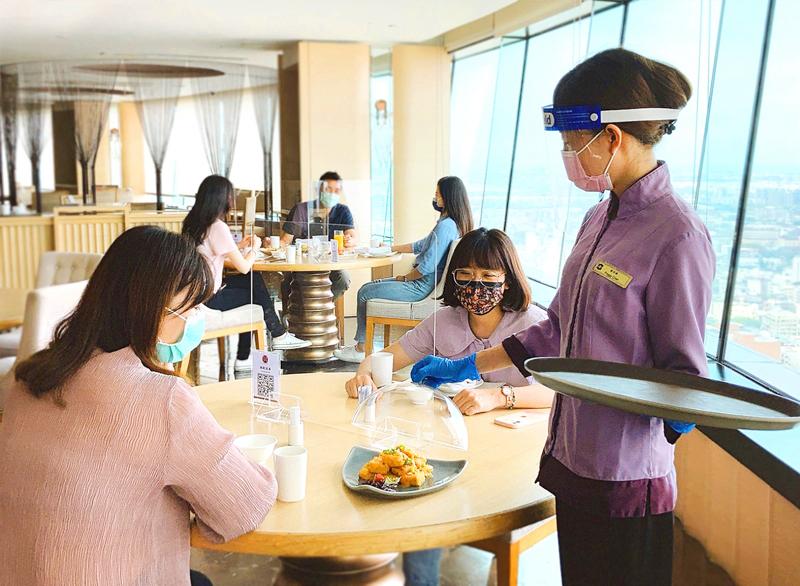Taipei’s five-star hotels have reopened their buffet restaurants at discounted charges to boost food sales after authorities last month gave the green light to conditional dine-in services.
Buffet restaurants, the main driver of hotels’ food revenue, have continued to be hit hard by social distancing requirements that ban guests from picking up food on their own to their heart’s content. Rather, waitstaff put the food on customers’ plates or customers place an order and waitstaff deliver to their table.
Shangri-La’s Far Eastern Plaza Hotel Taipei (台北遠東國際大飯店) yesterday reopened its buffet restaurant Cafe (遠東Cafe) and adopted the former style. It also gives guests a 25 percent discount coupon for use on their next visit. The coupons are valid until next month.

Photo provided by the Shangri-La Far Eastern Tainan
Latest Recipe (探索廚房), the upscale buffet restaurant of Le Meridien Taipei (台北寒舍艾美酒店) in Xinyi District (信義) follows the second model after the city allowed conditional in-dining on Aug. 3.
The restaurant is seeking to digest dining coupons it sold last year by inflating their value by 20 percent until the end of this month.
Restaurants are expecting better revenue next month, when the government rolls out its Quintuple Stimulus Vouchers program to invigorate domestic demand.
Taipei Garden Hotel (台北花園大酒店) near the city’s Ximen MRT Station has lowered charges to NT$599 per head from NT$899 for its buffet restaurant To-Gather Kitchen (饗聚廚房) with an extra free plate of roast beef at all meal times.
Its Prime One steak house offers guests who order set meals a full-lobster dish for NT$680. Guests may also use NT$1,000 in cash to pay for NT$1,300 of food and wine.

CAUTIOUS RECOVERY: While the manufacturing sector returned to growth amid the US-China trade truce, firms remain wary as uncertainty clouds the outlook, the CIER said The local manufacturing sector returned to expansion last month, as the official purchasing managers’ index (PMI) rose 2.1 points to 51.0, driven by a temporary easing in US-China trade tensions, the Chung-Hua Institution for Economic Research (CIER, 中華經濟研究院) said yesterday. The PMI gauges the health of the manufacturing industry, with readings above 50 indicating expansion and those below 50 signaling contraction. “Firms are not as pessimistic as they were in April, but they remain far from optimistic,” CIER president Lien Hsien-ming (連賢明) said at a news conference. The full impact of US tariff decisions is unlikely to become clear until later this month

With an approval rating of just two percent, Peruvian President Dina Boluarte might be the world’s most unpopular leader, according to pollsters. Protests greeted her rise to power 29 months ago, and have marked her entire term — joined by assorted scandals, investigations, controversies and a surge in gang violence. The 63-year-old is the target of a dozen probes, including for her alleged failure to declare gifts of luxury jewels and watches, a scandal inevitably dubbed “Rolexgate.” She is also under the microscope for a two-week undeclared absence for nose surgery — which she insists was medical, not cosmetic — and is

GROWING CONCERN: Some senior Trump administration officials opposed the UAE expansion over fears that another TSMC project could jeopardize its US investment Taiwan Semiconductor Manufacturing Co (TSMC, 台積電) is evaluating building an advanced production facility in the United Arab Emirates (UAE) and has discussed the possibility with officials in US President Donald Trump’s administration, people familiar with the matter said, in a potentially major bet on the Middle East that would only come to fruition with Washington’s approval. The company has had multiple meetings in the past few months with US Special Envoy to the Middle East Steve Witkoff and officials from MGX, an influential investment vehicle overseen by the UAE president’s brother, the people said. The conversations are a continuation of talks that

Alchip Technologies Ltd (世芯), an application-specific integrated circuit (ASIC) designer specializing in artificial-intelligence (AI) chips, yesterday said that small-volume production of 3-nanometer (nm) chips for a key customer is on track to start by the end of this year, dismissing speculation about delays in producing advanced chips. As Alchip is transitioning from 7-nanometer and 5-nanometer process technology to 3 nanometers, investors and shareholders have been closely monitoring whether the company is navigating through such transition smoothly. “We are proceeding well in [building] this generation [of chips]. It appears to me that no revision will be required. We have achieved success in designing